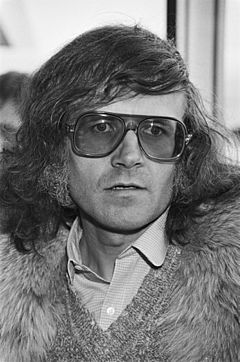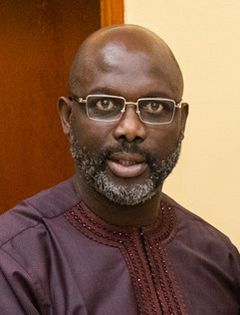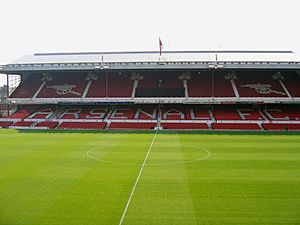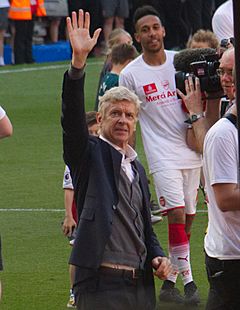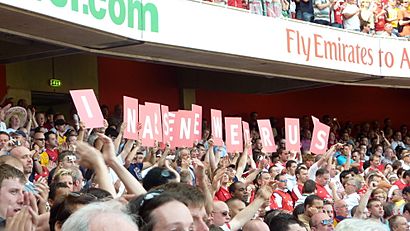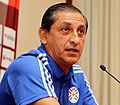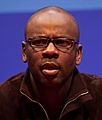Arsène Wenger facts for kids
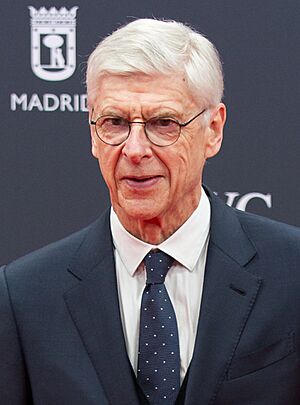
Wenger in 2024
|
|||
| Personal information | |||
|---|---|---|---|
| Full name | Arsène Charles Ernest Wenger | ||
| Date of birth | 22 October 1949 | ||
| Place of birth | Strasbourg, France | ||
| Height | 1.91 m (6 ft 3 in) | ||
| Position(s) | Midfielder | ||
| Youth career | |||
| 1963–1969 | FC Duttlenheim | ||
| 1969–1973 | Mutzig | ||
| Senior career* | |||
| Years | Team | Apps | (Gls) |
| 1969–1973 | Mutzig | ||
| 1973–1975 | Mulhouse | 56 | (4) |
| 1975–1978 | ASPV Strasbourg | ||
| 1978–1981 | RC Strasbourg | 11 | (0) |
| Total | 67+ | (4+) | |
| Managerial career | |||
| 1984–1987 | Nancy | ||
| 1987–1994 | Monaco | ||
| 1995–1996 | Nagoya Grampus Eight | ||
| 1996–2018 | Arsenal | ||
| *Club domestic league appearances and goals | |||
Arsène Charles Ernest Wenger (born 22 October 1949) is a French former football manager and player. He now works as FIFA's Chief of Global Football Development. He is most famous for managing Arsenal from 1996 to 2018. He was the club's longest-serving and most successful manager.
Wenger changed English football in many ways. He introduced new ideas for scouting players, training, and diets. These changes helped make Arsenal a top team and made football more popular around the world in the 21st century.
Born in Strasbourg, France, Wenger learned about football from his father, who managed the local village team. After a quiet playing career, Wenger earned his manager's diploma in 1981. He managed Monaco, where he won the league title in 1988. He then coached in Japan before joining Arsenal in 1996.
At Arsenal, he was the first foreign manager to win the Premier League and FA Cup double in 1998. In the 2003–04 season, his team, known as "The Invincibles," won the league without losing a single game. He also holds the record for winning the FA Cup the most times, with seven victories. He left Arsenal in 2018.
Fans and the press often call him "Le Professeur" (The Professor) because of his thoughtful and serious personality. He is known for his attacking style of football and for finding and developing young, talented players.
Contents
Early Life and Playing Career
Arsène Wenger was born on 22 October 1949, in Strasbourg, France. He grew up in the nearby village of Duttlenheim. His family owned a small restaurant and a car parts business. Wenger said that watching the people in the restaurant helped him understand human psychology from a young age.
His father managed the local football team, and Wenger started playing when he was about six years old. Because his village was small, he didn't join a proper team until he was 12. Even as a teenager, he acted like a leader on the pitch, telling his teammates what to do.
Wenger's playing career was modest. He played as a midfielder for several amateur and semi-professional clubs, including Mutzig, Mulhouse, and ASPV Strasbourg. He was not very fast, but he was smart and could read the game well. While playing, he also studied at the University of Strasbourg and earned a degree in economics in 1974.
In 1978, he joined RC Strasbourg, the professional club he supported as a boy. He mostly played for the reserve team and helped coach the youth players. He made only 11 appearances for the first team. During this time, he studied for his coaching badges and received his manager's diploma in 1981.
Managerial Career
Early Career in France and Japan
Wenger's first big managing job was at AS Nancy in 1984. The club didn't have much money, so it was a difficult job. He introduced new ideas, like hiring a dietician to teach players about healthy eating. After three years, Nancy was relegated, but Wenger's skills had been noticed.
In 1987, he became the manager of Monaco. He signed talented players like Glenn Hoddle and George Weah. In his first season, Monaco won the French league title. They also won the Coupe de France (the French cup) in 1991.
After leaving Monaco in 1994, Wenger took a new challenge. He moved to Japan to manage Nagoya Grampus Eight. At first, the team struggled, but Wenger's methods soon worked. They finished as runners-up in the league and won two cups in 1995 and 1996. Wenger's time in Japan taught him a lot and helped him improve as a manager.
Arsenal: 1996–2018
Appointment and First Trophies
In 1996, Wenger was appointed manager of Arsenal. Many people in England had not heard of him, and some newspapers even printed the headline "Arsène Who?". He was the first French manager in the Premier League.
Wenger quickly made big changes. He changed the players' diets, banning junk food and promoting healthier options like pasta and boiled chicken. He also introduced new training methods. The players were unsure at first, but they soon saw the benefits.
In his second season (1997–98), Wenger led Arsenal to a historic "double." They won both the Premier League title and the FA Cup. He built a strong team with new signings like Patrick Vieira, Emmanuel Petit, and Marc Overmars.
The Invincibles and a New Stadium
Wenger's success continued. In the 2001–02 season, Arsenal won the double again. The team was full of stars like Thierry Henry, Dennis Bergkamp, and Robert Pires.
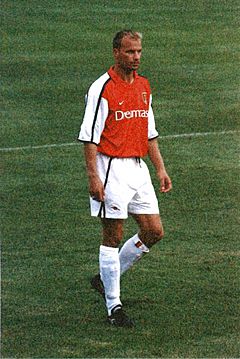
His greatest achievement came in the 2003–04 season. Arsenal won the Premier League without losing a single match. The team became known as "The Invincibles." They set a record of 49 league games unbeaten, which is still an English football record.
In 2006, Arsenal moved from their old stadium, Highbury, to the new Emirates Stadium. The move was expensive, so Wenger had to be careful with money. For several years, he focused on developing young players instead of buying expensive stars. During this time, Arsenal reached the Champions League final for the first time but lost to Barcelona.
Later Years and FA Cup Success
After the stadium move, Arsenal went through a period without winning a trophy. This lasted for nine years, which was frustrating for the fans. However, Wenger continued to keep the team competitive, always finishing in the top four of the Premier League.
The trophy drought finally ended in 2014 when Arsenal won the FA Cup. They won it again in 2015 and 2017. With his seventh FA Cup win in 2017, Wenger became the most successful manager in the competition's history.
By 2018, some fans felt it was time for a change. On 20 April 2018, Wenger announced he would leave Arsenal at the end of the season after 22 years at the club. His final home game was a 5–0 win against Burnley, where he received a warm farewell from the fans.
Life After Management
In November 2019, Wenger took on a new role as FIFA's Chief of Global Football Development. In this job, he is responsible for helping the sport grow all over the world. He also helps review and suggest changes to the rules of football.
Managerial Style and Philosophy
Tactics and Training
Wenger is known for his belief in attacking, entertaining football. His teams were famous for their quick passing and clever movement. He often used a 4–4–2 formation but was flexible and adapted his tactics over the years.
He trusted his players to make their own decisions on the pitch. He wanted them to be creative and express themselves. His training sessions were carefully planned and focused on technique and skill. He also brought new ideas about diet and fitness to English football, which helped his players stay healthier and have longer careers.
Finding and Developing Talent
One of Wenger's biggest strengths was his ability to spot young talent. He built a worldwide network of scouts to find promising players. He signed many young players who became world-class stars at Arsenal, including Thierry Henry, Patrick Vieira, and Cesc Fàbregas.
He was not afraid to give young players a chance in the first team. He believed in creating a team with a strong identity and a love for the club. This approach was especially important when Arsenal was paying for its new stadium and couldn't spend a lot of money on transfers.
Legacy
Arsène Wenger is considered one of the most important managers in the history of football. He changed Arsenal completely, turning them into one of the best teams in Europe. He also had a huge impact on the Premier League as a whole.
He introduced new professional standards for training, diet, and scouting. His success opened the door for other foreign managers to come and work in England. He is remembered for his dedication to playing beautiful, attacking football.
In his honor, Arsenal unveiled a bronze statue of him outside the Emirates Stadium in 2023. He was also inducted into the Premier League Hall of Fame.
Personal Life
Wenger was married to Annie Brosterhous, and they have one daughter named Léa. They separated in 2015. He is known for being very focused on his work and spends a lot of his free time watching football matches.
He can speak several languages, including French, German, English, Spanish, Italian, and some Japanese. He is a Roman Catholic and says his religious upbringing shaped his values. In 2020, he published his autobiography, My Life in Red & White.
Images for kids
-
Argentine striker Ramón Díaz came to Monaco under Wenger in 1989.
-
Dragan Stojković played well under Wenger's guidance at Nagoya Grampus.
-
Lilian Thuram made his debut for Monaco under Wenger.
-
A fan holds an Arsenal shirt with a message for Wenger at the 2018 FIFA World Cup.
Career statistics
| Team | From | To | Record | ||||
|---|---|---|---|---|---|---|---|
| P | W | D | L | Win % | |||
| Nancy | 1 July 1984 | 1 July 1987 | 114 | 33 | 30 | 51 | 28.9 |
| Monaco | 1 July 1987 | 17 September 1994 | 266 | 130 | 53 | 83 | 48.9 |
| Nagoya Grampus Eight | 1 February 1995 | 30 September 1996 | 87 | 49 | 4 | 34 | 56.3 |
| Arsenal | 1 October 1996 | 13 May 2018 | 1,235 | 707 | 280 | 248 | 57.2 |
| Total | 1,702 | 919 | 367 | 416 | 54.0 | ||
Honours
Player
RC Strasbourg
- Division 1: 1978–79
Manager
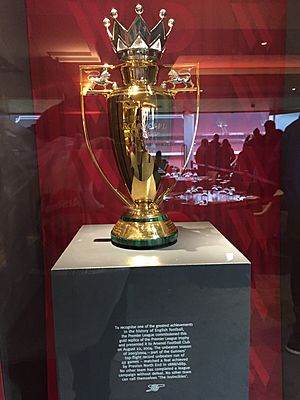
Monaco
- Division 1: 1987–88
- Coupe de France: 1990–91
Nagoya Grampus
- Emperor's Cup: 1995
- Japanese Super Cup: 1996
Arsenal
- Premier League: 1997–98, 2001–02, 2003–04
- FA Cup: 1997–98, 2001–02, 2002–03, 2004–05, 2013–14, 2014–15, 2016–17
- FA Charity/Community Shield: 1998, 1999, 2002, 2004, 2014, 2015, 2017
Individual
- J. League Manager of the Year: 1995
- Onze d'Or Coach of The Year: 2000, 2002, 2003, 2004
- Premier League Manager of the Season: 1997–98, 2001–02, 2003–04
- LMA Manager of the Year: 2001–02, 2003–04
- BBC Sports Personality of the Year Coach Award: 2002, 2004
- World Soccer Manager of the Year: 1998
- FWA Tribute Award: 2005
- English Football Hall of Fame: 2006
- France Football Manager of the Year: 2008
- IFFHS World Coach of the Decade: 2001–2010
- Premier League Manager of the Month (15 times)
- Laureus Lifetime Achievement Award: 2019
- Premier League Hall of Fame: 2023
Orders
- Knight of the Legion of Honour: 2002
- Honorary Officer of the Order of the British Empire: 2003
See also
 In Spanish: Arsène Wenger para niños
In Spanish: Arsène Wenger para niños


